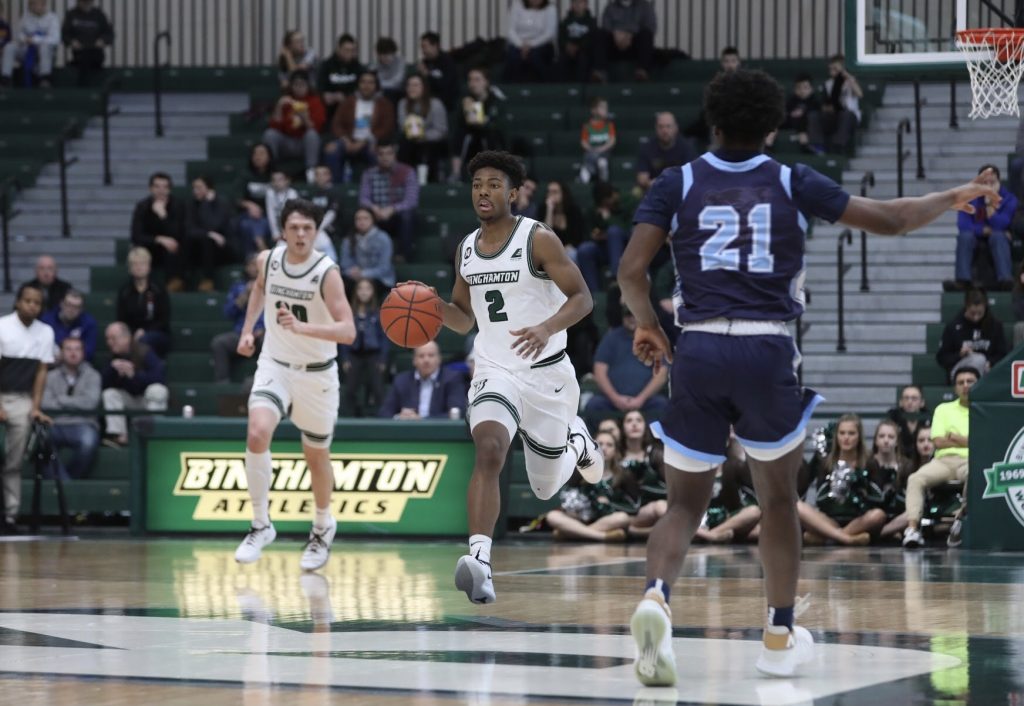Last week, the NCAA Division I Council dealt with a number of major legislative changes to accommodate student-athletes through an unprecedented time in college athletics. Most notably, they granted an additional year of eligibility to winter sport athletes playing in the upcoming season, meaning Binghamton’s basketball players and wrestlers will not lose a year of eligibility for participation in this season.
“The pandemic will continue to impact winter sport seasons in ways we can’t predict,” said Pennsylvania athletics director and Council chair M. Grace Calhoun. “The actions today ensure the continuation of local decision-making in the best interest of each institution and its student-athletes.”
In conjunction with eligibility for individual athletes, Division I schools are not required to sponsor a team for each season and can opt out of participation altogether, based on their individual circumstances. As a result, multisport conferences are no longer required to meet the minimum team sponsorship requirements. Participating teams are only required to play 50 percent of the scheduled dates of the competition to retain eligibility for championship contention. Additionally, the otherwise standard win-loss record of .500 or better is no longer a prerequisite for at-large selection in major championships.
Unrelated to the pandemic, changes could be coming to the transfer process for athletes participating in revenue sports. Currently, student-athletes competing in football, men’s and women’s basketball, men’s hockey and baseball are required to sit-out for a year after transferring, unless they are a graduate transfer. However, the Council has proposed a measure for all student-athletes to be able to transfer and compete immediately once after the transfer, regardless of their sport and without a waiver. The proposal also states that the head coach at the new school and the student-athlete must confirm that no tampering took place, and the Council would be able to set deadlines for student-athletes to provide written notification of their transfer to a new school. For fall and winter sport athletes, the deadline is May 1, and for spring athletes, it is July 1.
“This proposal creates a uniform, equitable approach for all student-athletes, no matter the sport they play,” said Jon Steinbrecher, Mid-American Conference commissioner and vice chair of the Council. “We believe the proposal fulfills the promise of the transfer resolution adopted by the Council in the spring, and trust the membership will strongly consider bringing consistency and predictability to Division I transfer regulations while treating student-athletes across all sports alike and in a sensible fashion.”
The council expects to vote on this measure during the 2021 NCAA Convention in January, and if approved, it would take effect for the 2021-22 academic year.
Also introduced at the meetings was legislation regarding student-athletes being allowed to profit off of their names, images and likenesses. Should the new rules be adopted, student-athletes would be able profit by holding camps and clinics, private lessons and by marketing products and services. Also, athletes will be allowed to be financially compensated for autographs and personal services and can crowdfund for nonprofits or charitable organizations, catastrophic events and family hardships.
“This is an important milestone in the progress toward modernizing Division I rules to better support student-athletes in all of their endeavors,” Calhoun said. “We know additional refinements may be needed as we make sure modifications are fair, recognize the importance of the current recruiting structure and that every student-athlete has the same opportunity to benefit.”
However, student-athletes would still have some promotional limitations. First, they would not be allowed to use their school’s marks in any advertisements, endorsements, personal appearances or promotions. Furthermore, endorsing activities conflicting NCAA legislation, such as banned substances or sports wagering, would still be strictly prohibited, and the school in question would be forced to disclose that information when the student-athletes signs a financial aid agreement.
As with the transfer proposal, the name, image and likeness legislation is expected to be voted on in January.



